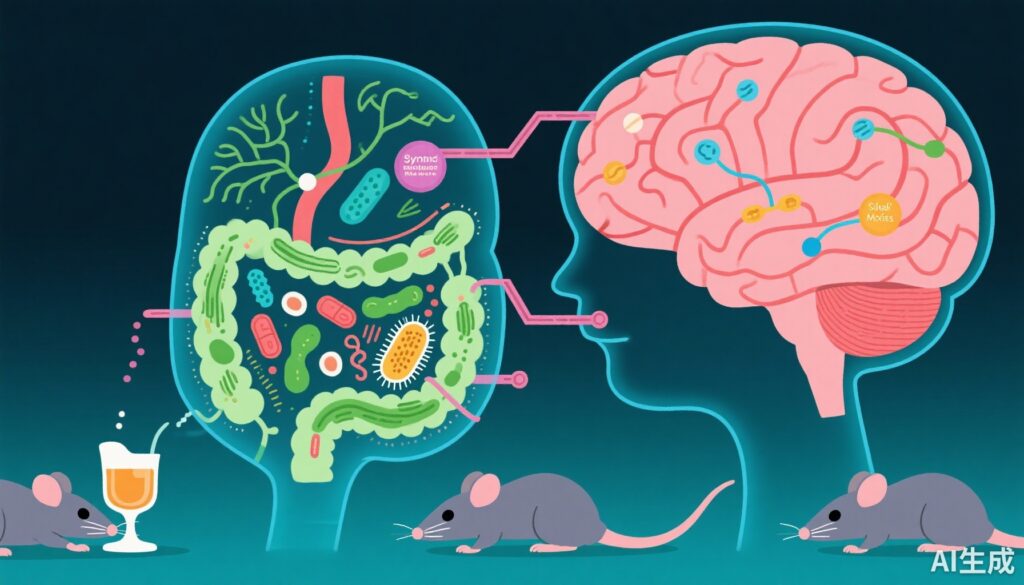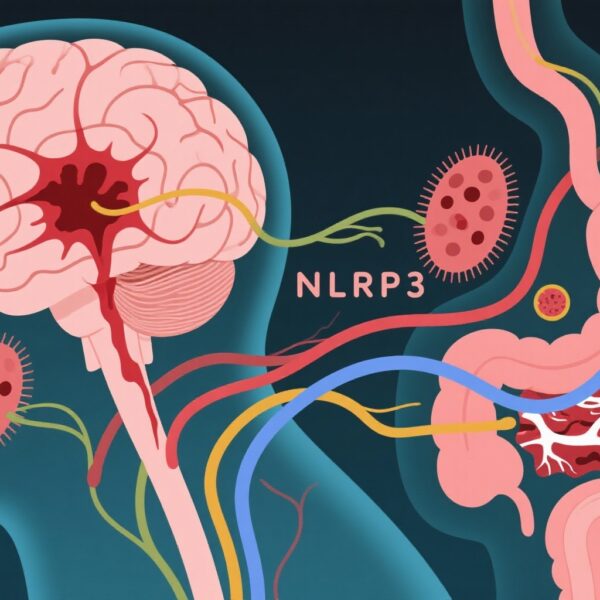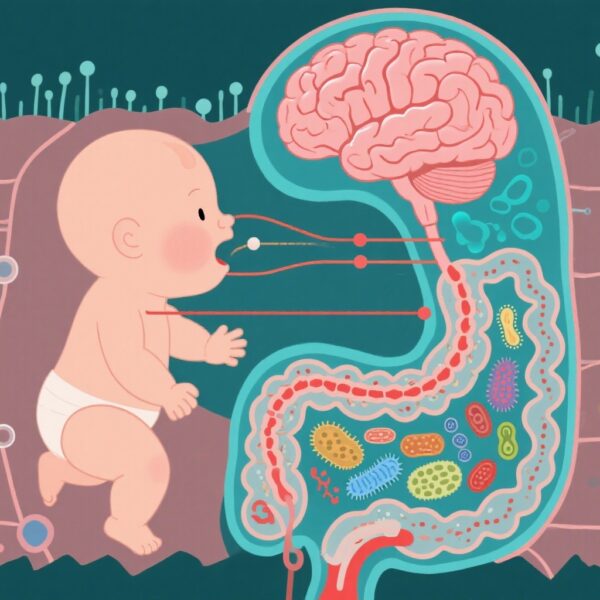Highlight
1. Alcohol drinking during adolescence induces distinct alterations in gut microbiota compositions and associated short-chain fatty acid (SCFA) profiles, leading to cognitive deficits in adulthood.
2. A targeted synbiotic intervention effectively restores gut microbiota balance, normalizes brain metabolite profiles, and reverses social and nonsocial cognitive impairments in mice.
3. Correlative networks suggest mechanistic links between specific gut bacteria, SCFAs, and brain metabolites such as β-hydroxybutyrate and glutamate, crucial for cognitive functions.
4. Synbiotic supplementation emerges as a promising therapeutic strategy to counteract long-term behavioral and molecular sequelae of adolescent alcohol binge consumption.
Study Background and Disease Burden
Adolescence is a critical developmental period marked by an increased propensity toward risk-taking behaviors, including substance abuse such as alcohol consumption. Early and intermittent exposure to alcohol, especially in binge or sub-binge patterns, carries substantial risk for long-lasting cognitive and neurobehavioral impairments. These disturbances include deficits in sociability, memory, and executive function, which collectively contribute to decreased life quality and higher vulnerability to psychiatric disorders later in life.
Emerging evidence underscores the pivotal role of the microbiota-gut-brain axis in neurodevelopment and neurobehavioral regulation. Gut microbiota-derived metabolites such as short-chain fatty acids and ketone bodies modulate neuroinflammation, neurotransmitter systems, and energy metabolism in the central nervous system. However, alcohol disrupts gut microbial communities and metabolite generation, exacerbating brain dysfunction. Therapeutic interventions targeting this bidirectional axis represent a novel frontier for mitigating the adverse sequelae of adolescent alcohol use.
Study Design
This study employed a drinking-in-the-dark (DID) model of intermittent voluntary alcohol exposure in adolescent male mice to mimic sub-binge drinking patterns. The intervention group received a synbiotic formulation—a combination of prebiotics and probiotics—administered concomitantly with alcohol exposure.
Microbial profiling was performed to assess shifts in gut bacterial taxa and fecal SCFA concentrations. Behavioral assays evaluated social and nonsocial cognitive domains in adulthood. Brain metabolomics analyzed β-hydroxybutyrate and glutamate levels in the prefrontal cortex and hippocampus, regions critical for cognition and memory. Correlational analyses were conducted to identify functional networks linking gut microbiota, metabolites, and behavioral outcomes.
Key Findings
Alcohol drinking during adolescence led to a significant increase in the relative abundance of Erysipelotrichaceae along with decreased fecal levels of butyric and isovaleric acids. In adulthood, additional taxa such as the Rhodospirillales uncultured family and Enterorhabdus uncultured bacterium showed altered abundance, correlating with persistent cognitive impairments.
Behaviorally, alcohol-exposed mice exhibited deficits in social interaction paradigms and nonsocial cognitive tasks, paralleling disruptions in metabolic profiles—namely, reduced β-hydroxybutyrate concentration in the prefrontal cortex and altered hippocampal glutamate metabolism.
The synbiotic treatment reversed these microbial distortions, normalizing Erysipelotrichaceae levels and restoring fecal SCFA concentrations. Functionally, synbiotic supplementation ameliorated cognitive deficits, improving sociability and memory performance in treated mice relative to untreated alcohol-exposed controls.
Notably, two correlative functional networks were identified: one linking gut microbes (Actinobacteria and Lactobacillaceae) and isovaleric acid with prefrontal glutamate metabolism and social behavior; the other associating multiple SCFAs (propionic, butyric, valeric, isovaleric acids) with hippocampal β-hydroxybutyrate and reference memory performance. These networks provide mechanistic insight into how gut-brain axis modulation mediates cognitive restoration.
Expert Commentary
This study elegantly integrates microbiota analysis, neurochemical profiling, and behavioral neuroscience to demonstrate that synbiotics may effectively counteract the deleterious impact of adolescent alcohol intake. The normalization of SCFAs and key brain metabolites involved in excitatory neurotransmission and energy homeostasis underscores the biological plausibility of synbiotic therapy.
However, caution is warranted in directly extrapolating rodent findings to human adolescents, given interspecies differences and the controlled nature of alcohol exposure in experimental settings. Future clinical trials are necessary to evaluate safety, optimal formulation, dose, and timing of synbiotic treatment in at-risk youth populations.
Moreover, this research highlights the importance of early intervention during adolescence to prevent irreversible neurocognitive damage linked to alcohol abuse. Integrating microbiota-targeted strategies could complement existing psychosocial and pharmacological approaches.
Conclusion
In summary, this study provides compelling evidence that synbiotic supplementation reverses alcohol-induced gut dysbiosis, restores essential microbial metabolites, and ameliorates cognitive impairments through modulation of the microbiota-gut-brain axis. Targeting this axis represents a promising therapeutic avenue for mitigating the long-term consequences of adolescent alcohol exposure. Further translational and clinical research will be critical to harness the full potential of synbiotics in human populations vulnerable to substance-related neurocognitive disorders.
References
1. Barrera-Conde M, Korchevaya E, Kossatz E, et al. Synbiotic intervention reverses alcohol drinking-induced cognitive deficits in adolescent male mice by modulating the microbiota-gut-brain axis. Gut Microbes. 2025;17(1):2551104. doi:10.1080/19490976.2025.2551104.
2. Cryan JF, O’Riordan KJ, Cowan CSM, et al. The Microbiota-Gut-Brain Axis. Physiol Rev. 2019;99(4):1877-2013. doi:10.1152/physrev.00018.2018.
3. Slykerman RF, Hood F, Wickens K, et al. Probiotic supplementation in pregnancy and infancy and subsequent neurodevelopmental outcomes: A systematic review. BJOG. 2017;124(9):1356-1363. doi:10.1111/1471-0528.14670.
4. Leclercq S, Matamoros S, Cani PD, et al. Intestinal permeability, gut-bacterial dysbiosis, and behavioral markers of alcohol-dependence severity. Proc Natl Acad Sci U S A. 2014;111(42):E4485-93. doi:10.1073/pnas.1415174111.



